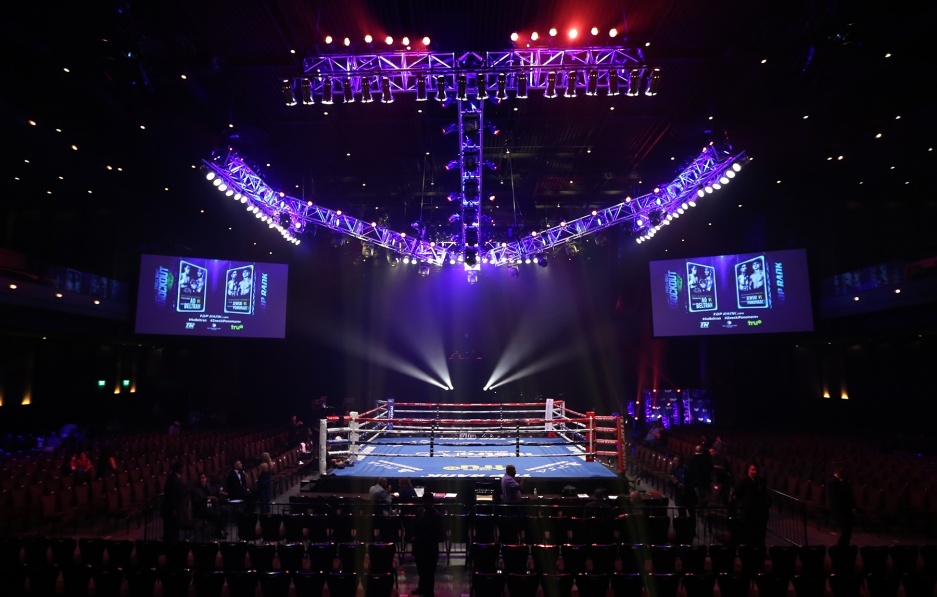Friday, August 13th 2010
“The Boxing Ring Sees No Color,” Says Promoter Terry Lane
On Independence Day, 1910, Reno, Nevada hosted one of the most important matches in boxing history: a title bout between the first African-American heavyweight champion, Jack Johnson, and former champ Jim Jefferies. Dubbed the “Battle of the Century,” the fight was about more than who would walk away with the title. It was about the backward state of race relations in America.
Many prominent whites, including Jack London, had urged Jefferies to emerge from retirement to challenge Johnson, whom they regarded as a threat to the prevailing racial order. London and company were right: Johnson was a threat. He boldly, and publicly, stood up to racism at a time when doing so could get him killed. Indeed, the day he faced Jefferies, rumors swirled that a sniper was in the crowd waiting to murder Johnson, according toAN ARTICLE PUBLISHED BY THE SWEET SCIENCE. The rumors turned out to be false, and Johnson emerged victorious, prompting a string of deadly race riots across the country.
This Independence Day weekend, Reno’s Grand Sierra Resort will hostA SERIES OF EVENTS CELEBRATING THE 100TH ANNIVERSARY OF JOHNSON’S HISTORIC WIN, including A SPECIAL FIGHT CARD Saturday, July 3. Co-promoted by Top Rank and legendary referee Mills Lane’s LET’S GET IT ON PROMOTIONS, the fight features Filipino welterweight MARK MELLIGEN and Mexican flyweight ULISES SOLIS.
In the first installment of our three-part interview series, we spoke with Lane’s eldest son, Terry–who, along with his brother, Tommy, now runs the company his father founded–about how the Johnson-Jefferies fight showed the boxing ring sees no color, the rugged individualism of Nevadans, and what it’s like being in Reno during this important time.
Talk about the Johnson-Jefferies fight.
It was one of the more important events in the world in the early part of the 20th century. It really showed that the boxing ring sees no color. The boxing ring is the great equalizer. And Jack Johnson won because he was the better fighter–he was the better man that day. Jim Jefferies did not win simply because he was white, which was what a lot of people thought was gonna happen. It just was one of those events that transcended boxing, and for this one day in 1910, all of the eyes of the world were on Reno, Nevada.
So it was very important to Nevada; it was very important to the city of Reno. I was born and raised in Reno. [I] obviously grew up around the boxing community. So, the fabled Johnson-Jefferies fight was always–I’ve heard things about it ever since I’ve been alive. And ever since I can remember, there was going to be something happening for the 100th birthday of this fight. I just never knew it was gonna be basically Let’s Get It On Promotions and myself and my family that would kind of spearhead this event happening this coming weekend.
Can you talk a little bit about what this fight meant for Reno?
First and foremost, Nevada was the only state at the time where boxing was fully legal. Boxing in Nevada was state-sanctioned going all the way back to the late 1800s. And the reason the fight got moved to Reno…was because the California governor…buckled under [outside] pressure and ordered the attorney general of California to halt the bout that was originally supposed to happen in San Francisco.
So, in three weeks’ time, a few Nevada towns bid on the fight. The governor welcomed it with open arms, going against an enormous amount of pressure to cancel the fight by several different types of groups around the world. We [Nevadans] like to consider ourselves the Old West still. We have this rugged individualism, libertarianism type of mentality. It was that way back then. To me, that event was one of the last great events of the Old West. Nevada was kind of these old cowboys, these miners. But at the same time, they were really progressive in their outlook on professional boxing. And they didn’t really care that Jack Johnson was black and Jefferies was white. They looked beyond that.
With all this going on, all this swirling around, the atmosphere inside the resort on Saturday for the actual fights will be pretty charged.
I’ve done a few fights here in Reno, but there’s never been this kind of energy. We have all these extra writers coming in. Fans are coming in from all over the world. We have people coming in from Australia, from England. There are the hardcore boxing junkies, the hardcore boxing historians. But it’s just great to see that there’s others out there who acknowledge what this event meant to the sport.
Check back for part two of our interview with Terry Lane tomorrow.


